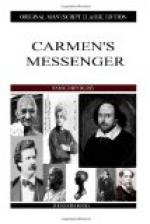Then he picked up Foster’s portmanteau and called a porter, who was moving some clanging milk cans, to bring his bag.
“Never mind; I’ll take it,” Foster told him.
“As you like, sir, but it’s perhaps not quite usual in this country,” the other answered in a deprecatory tone.
“I suppose I ought to have remembered that,” Foster agreed smiling.
They crossed the platform, and while they waited for the bag the man said respectfully, “Might I ask if Mr. Lawrence was better when you left, sir? It was a disappointment to us when we heard he could not come home.”
Foster liked the fellow. He was very formal, but seemed to include himself in his master’s family.
“Yes,” he said. “In fact, I expect he’ll be quite well in a month or two. I suppose you were at the Garth before my partner left?”
“I’ve served Mr. Featherstone for thirty years, sir, and led Mr. Lawrence’s first pony and cleaned his first gun. It wasn’t my regular duty, sir, but he was the only son and I looked after him. If I may say so, we were much upset when we heard that he was ill.”
Then the bag was brought, and as the car ran across the moor Foster noted the smooth, hard surface of the wet road. The country was wild and desolate, but they had no roads like this in Canada, except perhaps in one or two of the larger cities. Indeed, in Western towns he knew, it was something of an adventure to cross the street during the spring thaw. The light got red and angry as they dipped into the valley; the firs on the hillcrest stood out black and sharp, and then melted into the gray background. A river pool shone with a ruby gleam that suddenly went out, and the dim water vanished into the shadow, brawling among the stones.
There was smooth pasture in the valley, broken by dark squares of turnip fields and pale stubble; but here and there the heath appeared again and wild cotton showed faintly white above the black peat-soil. By and by a cross, standing by itself on the lonely hillside, caught Foster’s eye, and he asked his companion about it.
“The Count’s Cross, sir; a courtesy title they held in the next dale. He was killed in a raid on a tower down the water, before the Featherstones came.”
“But did they bury him up there?”
“No, sir; they were all buried at night by the water of Langrigg, but when they were carrying him home in the mist by the hill road the Scots from the tower overtook them. The Count’s men were wounded and their horses foundered, but the Scots let them go when they found that he was dead. About 1300, sir. Somebody put up the cross to commemorate it.”
“They seem to have been a chivalrous lot,” Foster remarked. “I wonder if that kind of thing would happen nowadays!”
“I’m afraid one couldn’t expect it, sir,” the old fellow answered and Foster smiled.




